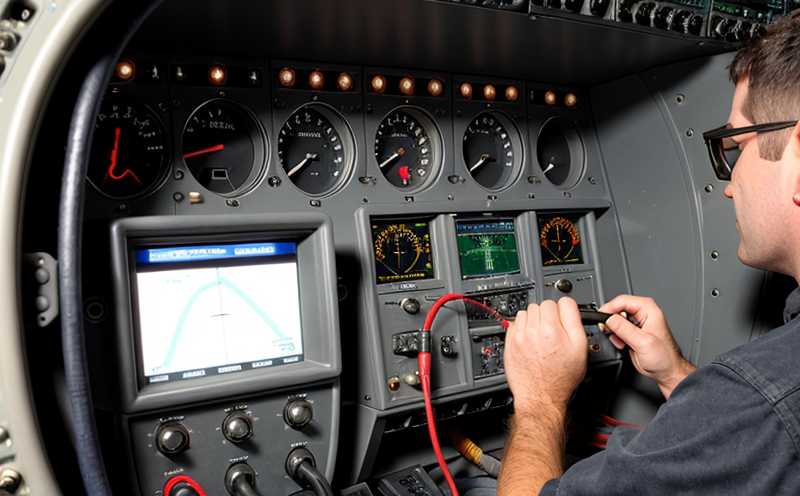RTCA DO-160 Section 21 Emission of RF Energy Testing
The RTCA DO-160 standard is a comprehensive set of guidelines for the environmental testing of aircraft and aviation systems. Among its many sections, Section 21 specifically addresses emissions of radio frequency (RF) energy from avionics and electrical systems. This section ensures that electronic components comply with strict emission limits to prevent interference with other on-board systems.
Emission of RF energy is a critical concern in the aerospace sector, where sensitive electronics must operate reliably under various environmental conditions. Uncontrolled emissions can lead to signal interference, which may compromise safety and functionality. This testing ensures that avionics and electrical systems adhere to stringent standards set by regulatory bodies.
RTCA DO-160 Section 21 tests are particularly important for devices like navigation systems, communication equipment, and power supply units. These tests help manufacturers verify that their products can withstand the electromagnetic environments they will encounter during flight. The testing process involves controlled exposure of electronic components to specific RF frequencies while monitoring for compliance with emission limits.
The key challenge in this testing lies in achieving accurate and repeatable results, given the variability of real-world operating conditions. At Eurolab, our approach ensures that each test is conducted under precise conditions that replicate actual flight environments. This includes using calibrated equipment to generate RF signals across a wide frequency range and measuring emissions with high sensitivity.
The testing procedure typically involves placing the device under test (DUT) in an anechoic chamber, which provides controlled electromagnetic interference-free conditions. The DUT is then exposed to specified RF frequencies, and emission levels are measured using specialized equipment. Compliance is determined by comparing the measured emissions against predefined limits outlined in RTCA DO-160 Section 21.
Understanding the real-world implications of this testing is crucial for aerospace professionals. For instance, non-compliance with these standards can lead to significant issues such as system malfunctions or even safety hazards during flight. By adhering to strict emission limits, manufacturers ensure that their products meet rigorous safety and performance criteria.
Another aspect of RTCA DO-160 Section 21 testing is its role in facilitating international harmonization. Compliance with these standards ensures compatibility across different regions, reducing the need for additional, region-specific certifications. This standardization is particularly valuable in the global aerospace industry, where products are sold internationally.
Environmental and Sustainability Contributions
- Emission control helps reduce unnecessary interference with other on-board systems, potentially improving fuel efficiency by preventing signal loss.
- By ensuring that avionics and electrical systems operate reliably under all conditions, this testing contributes to the longevity of aircraft components, reducing the need for frequent maintenance or replacement.
Why It Matters
The importance of RTCA DO-160 Section 21 cannot be overstated in the context of aerospace and aviation testing. Proper emission control is essential for maintaining system integrity, ensuring safety, and preventing malfunctions that could lead to catastrophic failures.
Non-compliance with these standards can have severe consequences. For example, interference between avionics systems could jeopardize communication between aircraft and ground stations or even between different aircraft in the air. This could result in critical information being lost or misinterpreted, potentially leading to accidents. Moreover, emissions that exceed allowable limits can interfere with other electronic devices on board, causing operational disruptions.
The aerospace industry is highly regulated, and compliance with standards like RTCA DO-160 Section 21 is mandatory for certification. Non-compliance not only risks delays in product release but also carries significant financial implications due to potential recalls or redesigns.
Given the stringent nature of these tests, it is crucial for manufacturers to have reliable and accurate testing facilities like those provided by Eurolab. Our state-of-the-art equipment ensures that each test meets the highest standards, providing confidence in the reliability and safety of the products being tested.
Eurolab Advantages
At Eurolab, we pride ourselves on offering comprehensive testing services tailored to meet the specific needs of the aerospace industry. Our expertise in RTCA DO-160 Section 21 testing is complemented by our commitment to quality and customer satisfaction.
- We employ highly skilled engineers with years of experience in aerospace testing, ensuring that each test is conducted with precision and accuracy.
- Our advanced equipment allows us to replicate a wide range of environmental conditions, providing the most realistic testing scenarios for our clients.
- We offer flexible scheduling options to accommodate busy product development cycles, ensuring minimal disruption to your workflow.
- Our team is dedicated to helping you interpret test results and identify areas for improvement, offering valuable insights that can enhance product performance.





